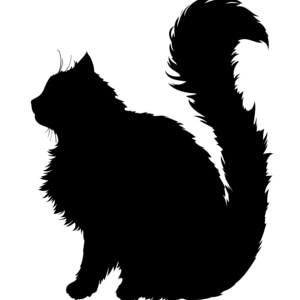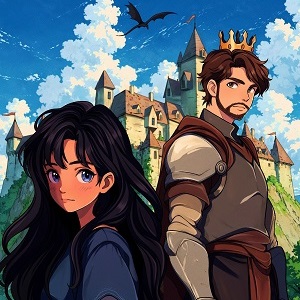The first order of business, apparently, was to fix my appearance so I looked more appropriate for being the king’s ward.
“Out,” I told the servant firmly.
“I can bring hot water and help clean,” she started to say.
“Out,” I repeated. I was perfectly capable of taking a bath on my own and I was not about to let Arthur’s decision to drag me here also result in people treating me like I was a child. I might not yet be an adult, but I was not a child.
She left, looking doubtful and muttering something about cold water, and I decided to barricade the door just in case.
I didn’t end up having a cold bath. Not that I would have cared if I did, it was just that I could heat water magically if I so desired. I was also more used to using a bathtub than the servant likely expected, because I wasn’t actually quite as uneducated as most of the people here seemed to consider.
When I finished and dried myself off, I dressed in the clothes Genevieve had given me prior to entering, which were basically nice servant clothes. I tied the laces and straightened the skirt, not too happy about not spotting a pouch or anything to use to put things in, and then frowned at the shoes.
“You’re evil,” I informed them. So I left them there and opened the door.
The room I’d been using appeared to be Genevieve’s personal facilities, and she was waiting in the adjoining room when I emerged. She gave me a tentative smile and held up a comb, wordlessly offering to help me with my hair.
I was used to, well, not doing anything with my hair. Maybe brushing it ever now and then if it was really bad, or just cutting out tangles that got too messy. I would comb my hair with my fingers on occasion, but that was about it. Yes, I had a comb available and knew how to use it, I just didn’t tend to care if my hair was wild and tangled and never really desired to have hair all brushed and fancy like Genevieve’s.
I eyed the comb distrustfully, but decided to go along with it, slumping into a chair and letting her start carefully working on the ends.
“So,” she said as she worked through the tangles, “I don’t actually know all that much about you personally. I know that Uther sent Arthur to a remote cabin a couple of times, as a sort of punishment. The first one was soon after his mother’s death and in the middle of winter, and he said he set out for town, got lost in the forest, and likely would have died from the cold if your mother hadn’t found him and helped him out. He said she also gave him the first sympathy he really got at the death of his mother – Uther, of course, hadn’t been sympathetic. She was merely a tool to him, a means to obtain an heir, but he didn’t care for her much at all.” Genevieve’s tone told me she disapproved of this, but was trying to stay neutral.
“I wasn’t at court at the time or I would have comforted him. We were childhood friends, and Uther decided to have us betrothed when we were fairly young. I cried a lot when I found out his mother died, because she had been a kind, if timid woman. I suppose, married to a king who made it no secret that he didn’t care for her, it isn’t surprising that she was timid. She had no one on her side at court, since most people were too afraid to say anything to Uther about, well, anything.”
She paused to work through a particularly tight tangle. “Arthur was one of the few who dared speak up, of course. He was aware that his position as prince meant that Uther wouldn’t dare kill him. It wasn’t that Uther was fond of him, but Uther cared deeply about having an heir of his own blood. He wanted to ensure his bloodline continued. Uther threatened several times to disown him, or even have him executed for treason when he spoke against him, and then to have another heir with Caelia, but everyone knew he wasn’t serious. Uther had a policy on not having a second child, actually, and it wasn’t a secret – he was worried that a second child would potentially challenge the first for the throne. In his mind, the strongest bloodline was one with just one heir and no possible challengers.”
I had no idea why I was getting a history of Uther and his policies, but I let her talk. I didn’t mind listening, really, plus it was probably a good idea to learn more about Arthur.
After all, if I was deciding to stick this out until I was an adult, I was aware that once I became an adult, I would still have to convince him to let me go. Convince him that I didn’t need to be married off – eww, not going to happen even if I had to go truly feral on them – and that I could return to my home without issue. Or something else. Maybe he wouldn’t be a fan of me going back to the forest, but I could convince him that letting me go to someplace where a lot of Arcane lived would work out. I’d have to figure out my plan over the next few years, and that started with understanding my opponent so I knew what would be most likely to convince him.
“Arthur and Uther have always a tenuous relationship, but there were times Uther was particularly angry. Caelia’s death was one of those times. He was furious at the assassins, at his guards, at Arthur even. The one thing Arthur always excelled in was in being a knight – he is, without question, the best knight this country has seen in decades, maybe longer. That was Uther’s greatest sense of pride in Arthur, and the thing he would brag about to other rulers. Arthur, on the other hand, believed that military arts were only part of making a great king and that his abilities, half talent and half hard work, deserved to be respected but not bragged about to that degree. And then, when the assassins killed Caelia, Uther blamed Arthur because, in his mind, Arthur being a great knight, even as a young man, meant he should have somehow known about the assassins and stopped them. Even though Arthur was probably your age at the time and it was Uther’s responsibility to know about potential threats. It wasn’t even like Arthur was kept in the loop about potential threats – Uther intentionally excluded him. But Uther was lashing out, angry that someone had actually gotten into the castle.”
She switched to a new section of hair. “To be honest, I don’t know if there was some part of him that was upset about her death because he was fond of her, but if there was, it came out as purely anger, lashing out at everyone around him. Several people were fired, unfairly, and when Arthur spoke up to try to defend them, Uther sent him to that cabin. Nearly cost him his son’s life, from what Arthur said. And would have, if it wasn’t for your mother.”
We were both quiet for a bit before she continued.
“Arthur told me your mother helped with his feelings of grief, of guilt given that Uther was blaming him – not that it was ever his fault – of all of that. He thinks that without her, he would have given up. Run away even. But she gave him a new resolve to stick it out and wait until someday when he would be king and could set a better example for his people. Create a kingdom built of fairness and respect, not on fear and anger.”
“Respect?” I muttered resentfully. “You call it respect when he drags someone away from their home, against their will, and for no reason?”
“He believes he has a reason,” she countered gently. “He believes you wouldn’t be safe on your own and that he is protecting you. Like I said, your mother is important to him, and in his mind, he is protecting someone important to your mother, in a way repaying her for what she did for him.”
I rolled my eyes. “My mother would lecture him if she was here. She’d tell him he shouldn’t ignore what someone is saying just because they’re a girl.”
“It’s not because you’re a girl!” Her tone was a bit sharper this time, then calm again as she continued. “In fact, that is part of Arthur’s goal. And mine. We could have ended the betrothal when Uther died, but we had already come up with a plan. We both believed in a goal of having a kingdom built on fairness and respect. Where everyone, no matter what or who they are, is treated with respect.”
I raised an eyebrow. “Right, and kidnapping me is part of treating people with respect? Sounds like he doesn’t practice what he preaches.”
She took a little longer to formulate a reply to this. “I won’t deny that it likely seems unfair and disrespectful to you, but that isn’t his intent. He believes he is trying to respect your mother, and your potential. To leave a young girl alone in the woods – ”
“Is what my mother would have wanted,” I interrupted, heatedly now. “I told him that. I told him that she’d decided I was old enough to be on my own and would be fine, and that was why she left. Because I was old enough to be fine on my own. And I agreed, for the record. She would have stayed longer if I wasn’t sure, but we both knew I would be fine on my own. But Arthur just decided on his own that we were both wrong. You want to say he’s respecting my mother? He’s not. And he doesn’t care about my life or potential or whatever. That is my home. My future is there. It is not here, stuck in stone rooms with no life to them. If he truly respected me or my mother, he would have left me alone. It was none of his business.”
I stood up, too upset to keep sitting quietly, and took the comb out of her hand, brushing much rougher than she had been. I didn’t even know why I was bothering finishing the job, but I was upset and agitated and brushing – even roughly – did actually seem to provide some sort of outlet for my anger.
Genevieve looked disturbed, and didn’t protest when I took the comb. “If your mother did indeed plan to leave you alone, then I can understand your anger and would have to agree that Arthur’s actions may have been unwarranted.”
Ever diplomatic, wasn’t she? She couldn’t quite admit he was wrong because she was going to be his queen and stand by his side, raise his children, and so on. She had to play the part of a diplomat even with an unwilling ward.
“But,” she continued slowly, “it also strikes me that your mother could have been wrong. I cannot imagine a world where a young girl would be okay in the woods like that. On her own, without anyone nearby.”
I dismissed her last issue easily. “There were animals nearby. And I went into a village occasionally for clothes or other supplies if needed. Plus,” I started ticking off on my fingers, “I know how to obtain my own food. Foraging, or gardening. Hunting, too. And caring for the meat and hide.” I didn’t kill any animals unless I had plans for their entire remains – bones included. However, I suspected she didn’t want to hear the details about that.
She raised an eyebrow, but didn’t stop me.
“I know how to repair things in the cabin if I have to. Mend blankets or my clothes, make new shingles, whatever is needed. I grew up learning how to do all of that. I know how to make a working water system, and how to build traps. I know how to create tools or weapons, and how to use them. I know how to kill things that threaten my existence.”
She looked even more doubtful, and I rolled my eyes a bit.
“We lived in the forest, Genevieve. The old forest. You think I didn’t spend my life surrounded by the woods and grow up learning how to live there? You learn the rules of the forest young. You learn how to coexist with the life there, and how to know when coexistence isn’t possible. You learn – or you die. And I didn’t die, did I? My mother lived there, and so did I, for years and years. I know far better than most humans what the consequences of not respecting the forest entail, and yet – and yet, most humans die when entering those woods, at least if they spend more than a few hours there, while I’ve spent my entire life in those woods. You think I don’t know those woods? You think somehow the risks of the forest were ignored until now?”
She opened her mouth, but I cut her off.
“Let me guess – you assume my mother protected me, and it was on her to make sure I was safe from those dangers. That’s partially true, when I was a very young child, but she only moved there shortly before I was born. I grew up in those woods, while she had to learn them. In many ways, I knew the forest better than she did.”
The only reason she hadn’t died in those woods was because of what she was, and, also being what she was, I had inherited that particular protection.
The creatures of the woods wouldn’t bother us. Not when we were far more dangerous than them, even when I was a small child.












Comments (6)
See all